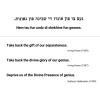4: Translations of the poem’s last line, Irving Howe (1969, 1987) and Kathryn Hellerstein (1999).
“El khanun” has been translated many times, and the final line, which uses two words with powerful resonances in traditional rabbinic culture, שכינה (shkhine) and גאונות (geoynes), has been translated in a number of different ways.
Suggested Activity: Read the original and each translation aloud while projecting them on a screen. Ask students to paraphrase each translation and to think about how they differ. How would these different final lines change the meaning of the poem?
Sources: Kadia Molodowsky, trans. Irving Howe, “God of Mercy,” in A Treasury of Yiddish Poetry, eds. Howe and Eliezer Greenberg (New York: Holt, Rinehart, and Winston, 1969), 289-90.
Kadia Molodowsky, trans. Irving Howe, “God of Mercy,” in The Penguin Book of Modern Yiddish Verse, eds. Howe, Ruth R. Wisse, and Khone Shmeruk (New York: Viking Penguin, 1987), 331-32.
Kadia Molodowsky, trans. Kathryn Hellerstein, “Merciful God,” in Paper Bridges: Selected Poems of Kadya Molodowsky, ed. Hellerstein (Detroit: Wayne State University Press, 1999), 355.
el_khanun_04_last_line.png
 Download image (30.48 KB)
Download image (30.48 KB)

